| Health Analytics & Business Affairs |
Administrative Support Services
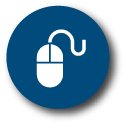 Goal: To provide effective and efficient support to all Durham Region Health Department (DRHD) divisions, programs and services that helps to enhance the delivery of the Ontario Public Health Standards and to meet all requirements of internal and external customers. Goal: To provide effective and efficient support to all Durham Region Health Department (DRHD) divisions, programs and services that helps to enhance the delivery of the Ontario Public Health Standards and to meet all requirements of internal and external customers.
- Review current administrative practices to identify efficiencies and modernize processes.
- Enhance governance and accountability by planning for the 2026 accreditation cycle, overseeing and monitoring DRHD’s Enterprise Risk Management program, managing all audit related matters, and reviewing DRHD’s policies and procedures.
- Provide financial training to DRHD’s management team to support improved financial management, budgeting, and reporting processes.
Community & Resource Development (CARD)
 Goal: To provide support to all DRHD divisions, programs, and services, helping to enhance compliance with the Ontario Public Health Standards. Goal: To provide support to all DRHD divisions, programs, and services, helping to enhance compliance with the Ontario Public Health Standards.
- Participate in the corporate website audit project to improve the usability, accessibility, and overall quality of DRHD’s webpages and Regional website.
- Develop and implement a DRHD media relations training program to provide divisions with access to in-house opportunities for interview training and skills development.
- Enhance capacity of the CARD team for developing online learning modules and producing public awareness videos.
Health Analytics & Research Team

Goal: To ensure public health practice responds effectively to current and evolving conditions and contributes to the public’s health and well-being with programs and services that are informed by the population’s health status, including social determinants of health and health inequities.
- Develop sustainable plans for using population health survey data from the Rapid Risk Factor Surveillance System, Ontario Student Drug Use and Health Survey, and the Canadian Community Health Survey.
- Publish at least three data summaries per quarter to DRHD’s Health Stats web page, replacing the pre-COVID data summaries with updated data and interpretation.
- Update Health Neighbourhoods data.
Health Policy & Equity Team
 Goal: Public health practice results in decreased health inequities so that everyone has equal opportunities for optimal health and can attain their full health potential without disadvantage due to social position or other socially determined circumstances. Goal: Public health practice results in decreased health inequities so that everyone has equal opportunities for optimal health and can attain their full health potential without disadvantage due to social position or other socially determined circumstances.
- Implement a focus group plan to understand staff’s health equity learning needs and inform a health equity capacity building strategy.
- Collaborate with Durham Region Social Services Department on initiatives that build capacity and improve access for staff, community partners, and clients to resources that address health equity and the social determinants of health.
- Pilot sociodemographic data collection with one DRHD program, and work collaboratively with staff to create processes, tools, and capacity building activities to support implementation.
Privacy & Information Security
 Goal: To provide effective and efficient privacy and information security support to all DRHD divisions, programs and services that helps to enhance compliance with applicable privacy and public health related legislation, information security standards and information management best practices. Goal: To provide effective and efficient privacy and information security support to all DRHD divisions, programs and services that helps to enhance compliance with applicable privacy and public health related legislation, information security standards and information management best practices.
- Review and update DRHD policies to demonstrate compliance with applicable legislation, standards, and best practices.
- Review and update DRHD’s Privacy Impact Assessment template taking into consideration a review of the federal government’s Algorithmic Assessment Tool for artificial intelligence systems.
- Update the application inventory for the Community Paramedicine program and identify which applications require a privacy impact assessment.
|
| Health Information Systems and Quality Assurance & Improvement |
Health Information Systems - Health Protection
Goal: To maintain and develop the Hedgehog application including the Check&GO! disclosure portal and to support staff working toward achieving compliance with the current Ontario Public Health Standards.
- Update recreation water modules in DRHD’s Hedgehog 5 (HH5) database to align with changes to R.R.O. 1990, Reg. 565: Public Pools and support DRHD’s recreational water program by providing staff training.
- Create custom forms in HH5 to capture details pertaining to Section 13 orders issued under the Infection Prevention and Control, Food Safety, and Safe Water programs as additional details are required for Ministry of Health reporting.
Health Information Systems - Population Health
Goal: To maintain and support the PROFILE application to meet requirements of documentation as per the applicable professional colleges, organizational policies, and to meet reporting requirements for programs and services outlined in the Ontario Public Health Standards.
- Create new PROFILE case for Emergency Management for documentation at evacuation/reception centres.
- Implement an audit program framework for PROFILE.
- Participate on the Provincial Immunization Repository Committee Data Migration Working Group to migrate relevant COVaxON data to Panorama.
Quality Assurance & Improvement
Goal: To ensure that programs and services meet requirements as articulated in policies, standards and legislation and to continuously improve the efficiency and effectiveness of services provided to Durham Region clients.
- Develop and implement a quality assurance (QA) audit for Health Protection’s Personal Service Settings (PSS) program, evaluate outcomes, and share findings with the PSS and childcare centre (CCC) program managers.
- Explore a QA audit for the CCC program, including an environmental scan, and determine how to develop an audit tool for implementation.
- Explore a QA audit for the Infectious Diseases Prevention & Control program, including an environmental scan, and determine how to develop an audit tool for implementation.
|
| Health Protection |
Durham Health Connection Line (DHCL)
 Goal: To respond to inquiries and requests for service, including applications for new businesses and special event vendors from the community. Goal: To respond to inquiries and requests for service, including applications for new businesses and special event vendors from the community.
- Respond to health protection related inquiries from the public and communities within prescribed reporting and response timelines.
- Review the DHCL Program Manual to ensure accuracy, efficiency, and value-added items for the team.
Emergency Management
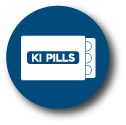 Goal: To enable consistent and effective management of emergency situations. Goal: To enable consistent and effective management of emergency situations.
- Participate in the planning, coordination, and execution of a regional exercise in collaboration with Durham Emergency Management, Regional departments, and community partners.
- Provide emergency management learning for all DRHD staff.
- Plan and launch three potassium iodide (KI) communication campaigns.
Food Safety
 Goal: To prevent or reduce the burden of food-borne illness. Goal: To prevent or reduce the burden of food-borne illness.
- Complete all required compliance and complaint-based inspections, and re-inspections across all risk categories, as mandated by the Ontario Public Health Standards.
- Develop and create a video blog on special event applications and processes, with potential to expand to multiple languages.
- Hold a minimum of two consistency training meetings with staff to review policies and processes, including information on cultural foods found during inspection.
Healthy Environments
 Goal: To prevent or reduce the burden of illness from health hazards in the physical environment. Goal: To prevent or reduce the burden of illness from health hazards in the physical environment.
- Complete the remaining reports in the Climate Change and Health Vulnerability Assessments (CCHVA) report series focused on solar ultraviolet radiation, vector-borne disease, air quality, food and water impacts, and extreme weather.
- Develop and implement a communications and knowledge exchange strategy to highlight the key findings of the CCHVA primer and reports in collaboration with DRHD’s Community & Resource Development team.
- Restore indoor air quality inspections and assessments in ice arenas.
- Host a forum to engage with municipalities to standardize and enhance communication and enforcement consistency for various issues across Durham Region.
Ontario Building Code - Part 8 (Sewage Systems)
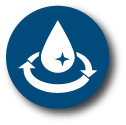 Goal: To prevent diseases in humans and contamination of the physical environment due to on-site private sewage systems. Goal: To prevent diseases in humans and contamination of the physical environment due to on-site private sewage systems.
- To create, modernize, and implement new Ontario Building Code – Part 8 user fees that better align with current business practices and manage cost recovery and inflationary pressures over the next three budget years.
- Review, revise, and complete the Ontario Building Code – Part 8 agreements for renewal with Durham Region’s seven municipalities.
- Inspect sewage systems within 100 meters of a shoreline or a tributary of Lake Simcoe to ensure private sewage systems are not malfunctioning and contaminating Lake Simcoe and any corresponding tributaries as per Ontario’s Building Code and contractual agreements with Brock, Scugog, and Uxbridge.
Safe Water
 Goal: To prevent or reduce the burden of water-borne illness related to drinking water and to prevent or reduce the burden of water-borne illness and injury related to recreational water use. Goal: To prevent or reduce the burden of water-borne illness related to drinking water and to prevent or reduce the burden of water-borne illness and injury related to recreational water use.
- Inspect all recreational water facilities in accordance with the provincial Operational Approaches for Recreational Water Guideline, 2018 and Recreational Water Protocol, 2019.
- Update all recreational water resources and inspection forms (including the pool/spa operator course) to reflect new amendments and updates to R.R.O. 1990, Reg. 565: Public Pools, and train staff on amendments and incorporating the new categories of cold plunge pools, hot water pools, floatation pools, and floatation tanks.
- Conduct all required inspections and assessments of small drinking water systems as mandated by the Ontario Public Health Standards.
- Review the Office of the Auditor General of Ontario’s report on Safety of Non-Municipal Drinking Water for impacts to DRHD’s Safe Water program and implement any changes where needed to ensure compliance.
- Create a new policy and procedure for blue-green algae response in drinking water and new content for the DRHD website related to impacts and precautions for municipal and private drinking water supplies.
|
| Healthy Families |
Durham Health Connection Line
 Goal: To ensure Durham Region residents have access to health information, counselling, and referral to appropriate resources on health issues as outlined in the Ontario Public Health Standards. Goal: To ensure Durham Region residents have access to health information, counselling, and referral to appropriate resources on health issues as outlined in the Ontario Public Health Standards.
- Respond to inquiries from the community.
- Collaborate with Population Health Division programs to deliver health education, counselling and referrals on topics identified in the Ontario Public Health Standards.
Infant & Child Development
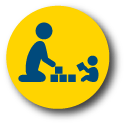 Goal: To enhance the growth and development of children, including those with a developmental disability and/or risk of developmental delay by partnering with families to provide support, information, and early intervention services. Goal: To enhance the growth and development of children, including those with a developmental disability and/or risk of developmental delay by partnering with families to provide support, information, and early intervention services.
- Provide home visiting services for children between the ages of birth to school entry and who have a developmental disability or who are at risk of a developmental delay.
- Provide resources and service coordination for families and increase awareness of inclusionary practices with community partners.
Pregnancy & Parenting, and Healthy Babies Healthy Children (HBHC)
 Goal: To achieve optimal preconception, pregnancy, newborn, child, youth, parental and family health. Goal: To achieve optimal preconception, pregnancy, newborn, child, youth, parental and family health.
- Implement a strategy to increase service providers' knowledge of Perinatal Mood Disorder and awareness of services and resources to support families impacted by it.
- Implement a communication plan to support healthy eating and address nutrition challenges for children aged six months to six years in Durham Region.
- Provide home visiting services to families identified with risk for compromised parenting and child development.
- Implement a plan to promote the HBHC program and referral process to healthcare providers, community agencies and Durham Region residents.
|
| Healthy Living |
Chronic Disease Prevention
 Goal: To reduce the burden of chronic diseases of public health importance* and improve well-being. Goal: To reduce the burden of chronic diseases of public health importance* and improve well-being.
*Chronic diseases of public health importance include, but are not limited to, obesity, cardiovascular diseases, respiratory disease, cancer, diabetes, intermediate health states (such as metabolic syndrome and prediabetes), hypertension, dementia, mental illness, and addictions.
- Increase the number of school communities (parents, educators, students) using resources to support tobacco and vape-free living.
- Develop a plan to identify public health roles and strategies to address local food insecurity.
- Support the development and implementation of a plan led by Durham Youth Health Group to address their identified topic of mental health.
Oral Health
 Goal: To enable all children in Durham Region to attain and sustain optimal oral health and development potential and to support adults who require assistance in accessing oral health information and services. Goal: To enable all children in Durham Region to attain and sustain optimal oral health and development potential and to support adults who require assistance in accessing oral health information and services.
- Ensure provision of the Ontario Seniors Dental Care Program and Healthy Smiles Ontario program to offer preventive, dental, and denture care services to eligible recipients in DRHD’s Dental Clinic.
- Continue to identify, develop, and implement initiatives that enhance accessibility to dental care services for residents in Durham Region, with a focus on addressing barriers and ensuring equitable access for all community members.
- Offer and provide dental screening to all children in participating Durham Region schools during the 2024/2025 and 2025/2026 school years and resume portable clinic services in high priority neighborhoods.
- Evaluate the feasibility of expanding the oral health school screening program in local Indigenous communities, working with Indigenous partners, for potential implementation in the 2025/2026 school year.
- Deliver health promotion activities and education focused on children and seniors' oral health in DRHD’s Dental Clinic, as well as at schools, community centres, long-term care homes, and community events.
- Expand services to include health promotion activities and dental screening in high priority childcare centres.
Prevention of Injury & Substance Misuse
 Goal: To reduce the burden of preventable injuries and substance use. Goal: To reduce the burden of preventable injuries and substance use.
- Increase the percentage of residents that are aware of the link between alcohol and cancer.
- Coordinate the implementation of the local opioid response plan in partnership with Durham Region Opioid Task Force members.
- Develop a mental health promotion framework to support and inform health programs and services across the lifespan.
School Health
 Goal: To achieve optimal health of children and youth in schools through partnership and collaboration with school boards and schools. Goal: To achieve optimal health of children and youth in schools through partnership and collaboration with school boards and schools.
- Deliver public health interventions to school communities using a comprehensive health promotion approach.
- Develop a plan to address health equity needs in schools in collaboration with DRHD’s Health Policy & Equity team.
Smoke-Free Ontario Act, 2017
 Goal: To ensure tobacco, e-cigarette vendors, and other organizations subject to the Smoke-Free Ontario Act, 2017 (SFOA) comply with the Act and restrict youth access to tobacco products and e-cigarettes. Goal: To ensure tobacco, e-cigarette vendors, and other organizations subject to the Smoke-Free Ontario Act, 2017 (SFOA) comply with the Act and restrict youth access to tobacco products and e-cigarettes.
- Explore potential amendments to the Durham Region Smoking and Vaping By-law #28-2019 with Legal Services.
- Train staff to enforce the federal Tobacco Tax Act.
- Post SFOA convictions in DRHD’s Hedgehog 5 (HH5) database and disclose them on Check&GO! to support current information management and transparency requirements.
|
| Infectious Diseases |
Immunization
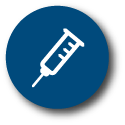
Goal: To reduce or eliminate the burden of vaccine preventable diseases through immunization.
- Provide provincially funded immunizations to all eligible Grade 7 and 8 students through school-based clinics at 190 elementary schools.
- Enforce Child Care and Early Years Act, 2014 compliance for all 211 licensed childcare sites.
- Support Immunization of School Pupils Act compliance in all students aged four to 17 years old for 39 secondary schools and 228 elementary schools for the 2024/2025 school year.
Infectious Diseases Prevention & Control - Health Protection
 Goal: To reduce the burden of communicable diseases and other infectious diseases of public health importance. Goal: To reduce the burden of communicable diseases and other infectious diseases of public health importance.
- Complete all sporadic disease investigations.
- Provide outbreak management support to long-term care homes (LTCH) and retirement homes (RH), congregate living settings, acute care, and childcare centres (CCC).
- Continue to collaborate with the Durham Infection Prevention and Control (IPAC) Hub to plan the annual education day.
- Inspect all personal services settings (PSS) and licensed CCC for compliance with relevant regulations, protocols and guidelines.
- Investigate and report IPAC lapses as required.
- Complete and launch the online PSS learning module for PSS operators.
- Complete the WEE CARE manual for CCC operators.
- Investigate all animal bite exposures for rabies control and ensure all pets are vaccinated for rabies.
- Plan and implement the Rabies Interagency Meeting.
- Plan, create and implement a new database for mosquito surveillance.
Infectious Diseases Prevention & Control - Population Health
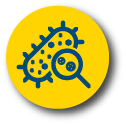 Goal: To reduce the burden of communicable diseases and other infectious diseases of public health importance. Goal: To reduce the burden of communicable diseases and other infectious diseases of public health importance.
- Manage all sporadic communicable disease cases and contacts in accordance with the provincial Infectious Diseases Protocol, 2023 and the disease specific appendices.
- Manage all suspected and confirmed cases of tuberculosis according to federal guidelines and provincial protocols.
- Manage all sexually transmitted/blood-borne infection cases and contacts in accordance with the Sexual Health and Sexually Transmitted/Blood-Borne Infections Prevention and Control Protocol, 2019.
- Offer sexual health services at DRHD’s two clinic locations.
|
| Paramedic Services |
 Goal: To deliver a quality Paramedic Services system that is responsive to client needs and reduce mortality and morbidity related to illness and injury through the provision of pre-hospital advanced life support procedures. Primary program delivery is through the Region of Durham Paramedic Services with assistance from the Central Ambulance Communications Centre and local fire department tiered response programs. Goal: To deliver a quality Paramedic Services system that is responsive to client needs and reduce mortality and morbidity related to illness and injury through the provision of pre-hospital advanced life support procedures. Primary program delivery is through the Region of Durham Paramedic Services with assistance from the Central Ambulance Communications Centre and local fire department tiered response programs.
- Develop a deployment plan to support the Medical Priority Dispatch System (MPDS).
- Support the Central Ambulance Communication Centre transition to the MPDS.
- Complete construction and take occupancy of the Seaton Paramedic Station.
- Continue to implement the Paramedic Master Plan with appropriate staffing enhancements.
- Develop and implement a strategy to address offload delays to ensure timely patient care transfer.
|

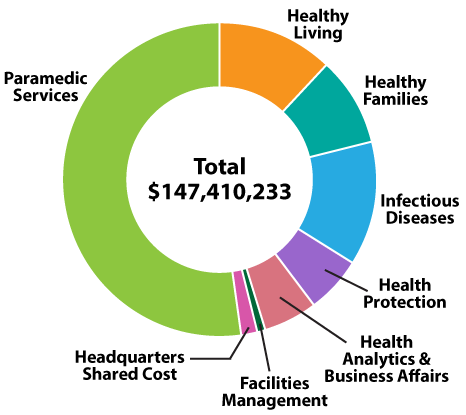







 Goal: Public health practice results in decreased health inequities so that everyone has equal opportunities for optimal health and can attain their full health potential without disadvantage due to social position or other socially determined circumstances.
Goal: Public health practice results in decreased health inequities so that everyone has equal opportunities for optimal health and can attain their full health potential without disadvantage due to social position or other socially determined circumstances. Goal: To enable consistent and effective management of emergency situations.
Goal: To enable consistent and effective management of emergency situations. Goal: To prevent or reduce the burden of food-borne illness.
Goal: To prevent or reduce the burden of food-borne illness. Goal: To prevent or reduce the burden of illness from health hazards in the physical environment.
Goal: To prevent or reduce the burden of illness from health hazards in the physical environment. Goal: To prevent diseases in humans and contamination of the physical environment due to on-site private sewage systems.
Goal: To prevent diseases in humans and contamination of the physical environment due to on-site private sewage systems. Goal: To prevent or reduce the burden of water-borne illness related to drinking water and to prevent or reduce the burden of water-borne illness and injury related to recreational water use.
Goal: To prevent or reduce the burden of water-borne illness related to drinking water and to prevent or reduce the burden of water-borne illness and injury related to recreational water use. Goal: To enhance the growth and development of children, including those with a developmental disability and/or risk of developmental delay by partnering with families to provide support, information, and early intervention services.
Goal: To enhance the growth and development of children, including those with a developmental disability and/or risk of developmental delay by partnering with families to provide support, information, and early intervention services. Goal: To achieve optimal preconception, pregnancy, newborn, child, youth, parental and family health.
Goal: To achieve optimal preconception, pregnancy, newborn, child, youth, parental and family health. Goal: To reduce the burden of chronic diseases of public health importance* and improve well-being.
Goal: To reduce the burden of chronic diseases of public health importance* and improve well-being. Goal: To enable all children in Durham Region to attain and sustain optimal oral health and development potential and to support adults who require assistance in accessing oral health information and services.
Goal: To enable all children in Durham Region to attain and sustain optimal oral health and development potential and to support adults who require assistance in accessing oral health information and services. Goal: To reduce the burden of preventable injuries and substance use.
Goal: To reduce the burden of preventable injuries and substance use. Goal: To achieve optimal health of children and youth in schools through partnership and collaboration with school boards and schools.
Goal: To achieve optimal health of children and youth in schools through partnership and collaboration with school boards and schools. Goal: To ensure tobacco, e-cigarette vendors, and other organizations subject to the Smoke-Free Ontario Act, 2017 (SFOA) comply with the Act and restrict youth access to tobacco products and e-cigarettes.
Goal: To ensure tobacco, e-cigarette vendors, and other organizations subject to the Smoke-Free Ontario Act, 2017 (SFOA) comply with the Act and restrict youth access to tobacco products and e-cigarettes.
 Goal: To reduce the burden of communicable diseases and other infectious diseases of public health importance.
Goal: To reduce the burden of communicable diseases and other infectious diseases of public health importance. Goal: To reduce the burden of communicable diseases and other infectious diseases of public health importance.
Goal: To reduce the burden of communicable diseases and other infectious diseases of public health importance. Goal: To deliver a quality Paramedic Services system that is responsive to client needs and reduce mortality and morbidity related to illness and injury through the provision of pre-hospital advanced life support procedures. Primary program delivery is through the Region of Durham Paramedic Services with assistance from the Central Ambulance Communications Centre and local fire department tiered response programs.
Goal: To deliver a quality Paramedic Services system that is responsive to client needs and reduce mortality and morbidity related to illness and injury through the provision of pre-hospital advanced life support procedures. Primary program delivery is through the Region of Durham Paramedic Services with assistance from the Central Ambulance Communications Centre and local fire department tiered response programs.